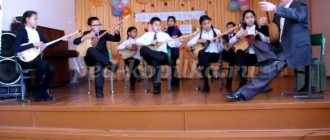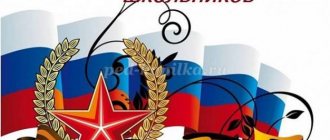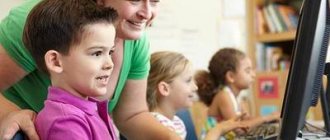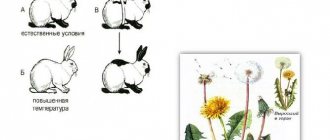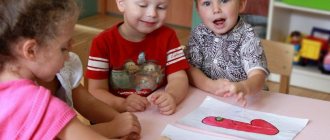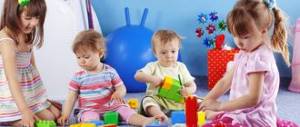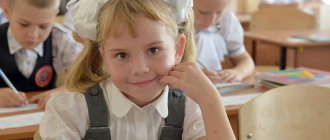Description of teacher's work experience
Angelica Bouchan
Description of teacher's work experience
all my teaching experience and experience in my favorite kindergarten “Forget-Me-Not”
in the beautiful village of Nizhnyaya Sinyachikha.
Working with preschool children is the most interesting, troublesome and hectic. I won’t say that I came into the profession by accident. The first seeds of my future profession were planted in me by my beloved mother as a child. Mom, Galina Antonovna, was a teacher with thirty years of experience. I remember, as a schoolgirl, I ran to her kindergarten, and we played with the little fidgets, and I dreamed that I would definitely choose the profession of a teacher. And now I’m thinking, what would I have done if I hadn’t become a teacher? I don’t know, I can’t even imagine how I would live without my whys. Now this is my home, where I am welcome, loved and appreciated. I rush here with interesting ideas and a good mood. With trepidation, I walk into the group of my students, and I am greeted by many children’s eyes: cheerful, serious, curious and crafty - this is the world of childhood.
What should a teacher be like?
A teacher is a multifaceted person. To be an educator means to be a master, that is, to continuously improve one’s skills, using the achievements of science and best practice, mastering innovative technologies and developing methods of education and training. A teacher needs a variety of knowledge to satisfy the curiosity of a modern child and help him understand the world around him. It is very important for the teacher, before developing the child’s personality, to become a personality himself.
Janusz Korczak wrote: “Know and educate yourself before you educate your children.”
.
Therefore, after graduating from pedagogical school, I knew that I still had a long and painstaking work to do on myself .
I don’t mean that the teacher should be perfect in everything, but children should respect him and strive to be like him. In addition, the teacher is a creator who turns a child’s ordinary day in kindergarten into an interesting and exciting journey, entertainment or a search for discoveries and secrets. The ability to transform and play any role helps me find an approach to each child, understand his inner world, reveal his abilities and talents, and awaken interest and love for creativity.
And the teacher must also be a creator. It’s not for nothing that children are called “the flowers of life”
, and teachers -
“gardeners”
. The only thing that a teacher always needs to remember is that all communication with a child should not be reduced only to the dry process of transferring knowledge. The main task of the teacher is to help the child become an individual.
V. A. Sukhomlinsky wrote: “It is very important to strive to become a good engineer, doctor, salesman. But striving to become a good person is even more important. You can become an engineer in five years, but you need to study to become a person all your life.”
Every educator should strive to develop in the child that uniqueness that will distinguish him from others, to teach the child to be well-mannered, responsible, to be able to reckon with others, to have human dignity, to respect himself, to be responsible.
“Before giving knowledge, one must teach to think, perceive, observe”
— wrote V. A. Sukhomlinsky.
The baby is a natural explorer of the world around him. The world opens up to the child through the experience of his personal feelings , actions and experiences.
“The more a child has seen, heard and experienced, the more he knows and assimilated, the more elements of reality he has in his experience , the more significant and productive, other things being equal, his creative and research activity will be,” wrote the classic of Russian psychology L. S. Vygodsky.
The development of cognitive activity in preschool children is especially relevant at the present stage, as it develops children's curiosity, an inquisitive mind and forms, on their basis, stable cognitive interests through research activities.
Yes! A preschooler is characterized by an increased interest in everything that happens around him. Every day children learn more and more new objects, they strive to learn not only their names, but their properties. Think about the simplest causes of observed phenomena. By maintaining children's interest, you need to lead them from acquaintance with the world around them to understanding it.
Therefore, the priority direction of my pedagogical activity is the development of cognitive activity in research activities in preschool children through active interaction teacher-child , child-child, child-parent, which is due to the requirements of the implementation of the federal state standard of preschool education.
The goal of my priority area is: Creating conditions for the development of cognitive activity in preschool children.
Tasks:
- systematize work on the development of cognitive and research activities of preschoolers through the introduction of new technologies;
-optimize the subject-spatial environment in the conditions of integration of the educational process;
-improve interaction with parents through the use of various forms of cooperation.
To realize my goals and objectives, I constantly strive for self-improvement, participate in seminars, in regional methodological associations, present the experience of teaching at the preschool level, participate in Municipal regional pedagogical readings , in competitions for methodological developments and projects , on the Internet.
Having drawn up the first individual profile of the cognitive development of my pupils in the group, I identified the following problem: children are often passive, have difficulty comparing various facts, putting forward hypotheses, drawing conclusions; there was a low presence of cognitive need and initiative.
This allowed me to identify the ways in which I can allow a child to develop, discover some abilities, overcome problems, find an individual approach, and also plan further activities in a priority area.
Modern approaches to organizing the educational process in the conditions of the Federal State Educational Standard suggest the following targets:
- the child shows initiative and independence in various types of activities - play, communication, cognitive and research activities, design, etc.; is able to choose his occupation and participants in joint activities;
- the child has a positive attitude towards the world, towards different types of work, other people and himself, has a sense of self-esteem; actively interacts with peers and adults, participates in joint games.
- the child has a developed imagination, which is realized in various types of activities, and above all in play;
— the child has developed gross and fine motor skills; he is mobile, resilient, masters basic movements, can control and manage his movements;
- the child shows curiosity, asks questions to adults and peers, is interested in cause-and-effect relationships, tries to independently come up with explanations for natural phenomena and people’s actions; inclined to observe and experiment. Has basic knowledge about himself, about the natural and social world in which he lives; is familiar with works of children's literature, has basic understanding of wildlife, natural science, mathematics, history, etc.; the child is capable of making his own decisions, relying on his knowledge and skills in various activities.
To cultivate these qualities in children, the need to update educational activities within the educational field “Cognitive Development”
.
The group created a cognitive development center “I Want to Know Everything
,” consisting of objects for children’s experimentation and
experiments with equipment and materials. Today, in general, in preschool education, the problem of organizing the leading type of activity of children in understanding the world around them is especially acute - experimentation. This activity equally influences the development of the child’s personality in the same way as gaming. The presence of these two truly children's activities is a favorable condition for the development of preschoolers. By experimenting, the child independently influences the objects and phenomena around him in various ways in order to more fully understand and master them. Experimental activities contribute to the formation of cognitive interest in children, develop observation and mental activity. According to Academician N.N. Poddyakov, in the activity of experimentation, the child acts as a kind of researcher, independently influencing the objects and phenomena around him in various ways for their more complete knowledge and mastery. During experimental activities, situations are created that the child resolves through experimentation and , by analyzing, draws a conclusion, independently mastering the idea of a particular law or phenomenon.
This center also includes a variety of didactic games aimed at the cognitive development of children, plant herbariums, a collection of minerals, thematic folders: “Seasons”
,
"Winter
spring
" . "Summer"
,
"Autumn"
,
"Pets"
,
"Animal Fossils"
, etc.
In addition, a series of excursions and walks to the immediate natural environment was developed , taking into account the regional specifics of the village of N. Sinyachikha. She created a selection of environmental games, a card index of experiences and experiments , and compiled comprehensive thematic planning in working with children . Successfully implemented new approaches taking into account cultural and semantic contexts, children traveled along the map and the “River of Time”
(according to the method of N. A. Korotkova)
. Children design various exhibitions:
“Gifts of Nature”
,
“Minerals”
,
“Rare Objects”
, etc. .
In search of interesting forms of working with children on cognitive development, they led me to the use of the project method. The implementation of project activities is carried out by all participants in educational relations based on the following principles;
— partnership between parents and educators in the upbringing and education of children;
teachers’ ’ understanding of value and target guidelines, objectives, means, conditions, and results of child development;
- help, support, respect and trust in the preschooler from teachers and parents;
— maximum use of educational potential in joint work with children ;
— constant analysis of the process of interaction between family and kindergarten.
Among the projects I have implemented is the long-term project “Link of Times”
— the goal of the project: to form the beginnings of moral and patriotic education through familiarization with the centuries-old history of our Motherland, native land, familiarization with the past and present.
The final product of this project was a holiday dedicated to Defender of the Fatherland Day. The project “We love fairy tales”
is the goal of the project: to create conditions for the spiritual and moral development of a child through Russian folk tales.
The product of this project was the theatrical performance “Kolobok and His Friends”
.
“Pokrov”
project is the goal of the project: to develop children’s cognitive interest in the history of their country, in the customs of antiquity, and in Russian folklore.
The result of this project was the entertainment "Cabbage"
.
“Medicinal Herbs”
under development - the goal is to introduce children to the medicinal plants of the Middle Urals, to cultivate a love for nature and a caring attitude towards it.
“A Link of Times” was the most interesting for children.
, the process of implementation of which involved the use of a wide variety of forms and methods
of work : viewing presentations on the topic, creating a hero’s costume, excursions to monuments to Civil and Military Soldiers, watching a film about Chapaev and his autobiography, etc.
In the same vein - for development cognitive activity in children, I have developed methodological developments for direct educational activities: “A miracle - a drop”
,
“It’s all water”
,
“Magic air”
,
“Portrait of the earth”
. Which are aimed at the formation of cognitive activity in the process of experimentation, facilitating the independent identification of the hidden properties of objects.
As a result of all the pedagogical activities, positive character traits began to appear more clearly in children - courage, determination, self-confidence, a need to search for new information, new knowledge, a desire to ask questions, and inextinguishable research activity. The children's vocabulary has increased. Children are able to name the properties of substances, their qualitative characteristics, and know the names of many representatives of living nature and their habitats. Children show persistence and the desire to finish what they start.
I believe that in cognitive and research activities a child gets the opportunity to directly satisfy his inherent curiosity. Organize your ideas about the world. Therefore, I strive to teach children not everything, but the main thing, not the sum of factors, but a holistic understanding, not only to give maximum information, but also to teach how to navigate its flow.
Working as a teacher , I can say that there is no better profession than my one! It makes you forget all your sorrows and grievances and gives you a feeling of eternal youth. This means wanting and being able to relive childhood again and again with each child, seeing the world through his eyes, being surprised and learning with him, being invisible when the baby is busy with his own business, and indispensable when he needs help and support.
Day after day passes, seasons change, year after year of my biography, experience comes through successes and failures, thoughts flow and flow like a river, I want to achieve more and more. I wish I could extend every day so that the day would be filled to the brim with great, good deeds, deeds, and only joy. After all, there is still so much unexplored and unknown ahead.
